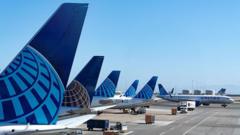In a federal notice dated May 1, Commerce Secretary Howard Lutnick announced the inquiry under the Trade Expansion Act, a law allowing the president to impose tariffs on foreign goods deemed as threats to national security. This follows prior tariffs on aluminum, steel, semiconductors, and pharmaceuticals.
The Commerce Department plans to gather industry feedback regarding domestic demand for aircraft and parts, the role of foreign suppliers, and government favoritism toward those businesses. While tariffs might protect domestic interests, they could negatively impact the aerospace sector, which has historically enjoyed a significant trade surplus and global leadership.
Eric Fanning, head of the Aerospace Industries Association, emphasized the industry's economic success and expressed a desire to collaborate with the Commerce Department to enhance the domestic supply chain while maintaining current trade frameworks.
Boeing primarily manufactures commercial aircraft and has reported minor immediate impacts from existing tariffs, but the company worries about their long-term effects on suppliers. Other industry players such as RTX and GE Aerospace have projected substantial costs resulting from tariffs, each estimating impacts of $850 million and $500 million respectively.
Historically, global governments have leveraged tariffs and subsidies to fortify their aviation industries, leading to long-standing disputes between the U.S. and EU regarding subsidies provided to Boeing and Airbus. In 2021, a cooperative resolve between the U.S. and Europe was reached after years of contention, focusing on countering China's industrial dominance.
Niraj Chokshi covers aviation, rail, and broader transportation sectors.
The Commerce Department plans to gather industry feedback regarding domestic demand for aircraft and parts, the role of foreign suppliers, and government favoritism toward those businesses. While tariffs might protect domestic interests, they could negatively impact the aerospace sector, which has historically enjoyed a significant trade surplus and global leadership.
Eric Fanning, head of the Aerospace Industries Association, emphasized the industry's economic success and expressed a desire to collaborate with the Commerce Department to enhance the domestic supply chain while maintaining current trade frameworks.
Boeing primarily manufactures commercial aircraft and has reported minor immediate impacts from existing tariffs, but the company worries about their long-term effects on suppliers. Other industry players such as RTX and GE Aerospace have projected substantial costs resulting from tariffs, each estimating impacts of $850 million and $500 million respectively.
Historically, global governments have leveraged tariffs and subsidies to fortify their aviation industries, leading to long-standing disputes between the U.S. and EU regarding subsidies provided to Boeing and Airbus. In 2021, a cooperative resolve between the U.S. and Europe was reached after years of contention, focusing on countering China's industrial dominance.
Niraj Chokshi covers aviation, rail, and broader transportation sectors.



















